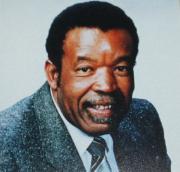
Dr Wele Cecil Manona was born in Durban location, Peddie in 1937 and completed his early schooling at the Methodist Mission school before proceeding to high school at Healdtown, from where he seemed doomed to a career as a teacher subjected to “Bantu Education”.
He escaped this fate by joining the SABC Xhosa radio service where he became very well known as a disc jockey – which was to stand him in good stead later when his greeting in many strange places brought the immediate and admiring response, “Manona!”.
Among his colleagues was a prodigious linguist called Peter Mtuze, whose “Afrikaans was so good that when he phoned Pretoria, they called him 'Meneer'!”
In his spare time, Wele completed a B.A. with honours in Anthropology through UNISA – a decision which brought him to the attention of Philip Mayer, the head of the Rhodes Anthropology Dept, and Jeff Opland, the energetic and creative Director of the I.S.E.R.
From 1975 to his retirement in 2002, Wele was a research officer with the I.S.E.R. He completed an M.A. on Burnshill, one of the villages in Keiskammahoek which had featured in the great Keiskammahoek Survey in the 1950s - the project which launched the I.S.E.R. and pioneered multi-disciplinary research into contemporary South African communities.
Wele's first decade or so with the I.S.E.R. coincided with remarkable developments under Jeff Opland's leadership. Visiting scholars from Yale and other New England universities were an annual delight – and most relied on Wele for guidance on local issues.
“Artists in Residence” brought African musicians and poets to the I.S.E.R. who likewise turned to Wele for advice on how to survive in Grahamstown West. A leaven of professors emeriti – notably Winnie Maxwell, Michael Roberts and Leslie Hewson – added gravitas to the tearoom; Simon Becker, in the newly created post of Development studies, brought the energy of a formidable researcher; and Andrew Tracey his encyclopaedic understanding of African Music to the party. The Anthropology Department next door was drawn into the mix as well. Wele's benign, modest guidance was a blessing to us all – not least to this writer, with whom he had many adventures.
When we were working at Ford Motor Coy. he interviewed some rough immigrant artisans, one of whom swore at him and ripped up the interview schedule. Wele smiled and duly noted this attitude to race relations in his logbook. When taking food to starving residents in Glenmore, he was stopped by the police. “What did you say?” I asked him. “Oh,” he replied, “I spoke bad English to them.” I looked puzzled. “Well, if you speak good English to them they think you are a cheeky K...; if you speak isiXhosa, you are being difficult; with Afrikaans they are at an advantage – so I speak bad English and we are O.K..”
During the roughest years of the Struggle, Rhodes offered his family a house on campus – not least because his twin daughters had broken the race barrier and been admitted to D.S.G., so had to be driven down Raglan Road in their uniforms each morning. His son was also trying to evade the police. Wele declined the offer – his credibility depended on his being in the heart of the community, and the family were not touched by the Comrades.
As his substantial research publications indicate, Wele and I did many things together – dozens of visits to pre-schools in the most deprived areas of Ciskei; evaluations of the “Sullivan Code” at Ford; labour relations at Magwa Tea estates; the Glenmore Feeding Scheme; a community study of a newly established “resettlement” in Ciskei. Even in retirement, in between his own writing and despite his failing health, he could always make himself available to guide and to advise. Our last trip together, barely a month before his death, was to the neglected cemeteries of Grahamstown East.
He died in St George's Hospital, Port Elizabeth on Monday 7th October, leaving his wife, Nobantu (herself well known and loved by generations of Graham House and Drosty Hall students where she worked for many years), his three daughters, his son and grandchildren. So, the University bids farewell to a brave and generous spirited scholar, and the anthropological community in particular to a much loved friend.
By Emeritus Professor in Anthropology, Prof Michael Whisson
